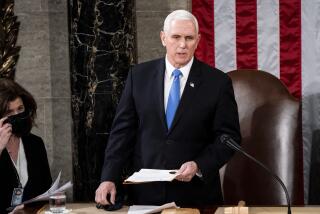Time to talk
WHETHER OR NOT Alberto R. Gonzales maintains his Rasputin-like survival in high office, Congress is rightly determined to find out how much of his responsibility the AWOL attorney general abdicated to the White House in the matter of eight fired U.S. attorneys -- and whether justice was obstructed in the process.
Any doubts President Bush might have entertained about that were dispelled last week when the chairmen of the House and Senate judiciary committees issued subpoenas respectively for former White House Counsel Harriet E. Miers and former political affairs director Sara M. Taylor. Both panels also are seeking documents connected to the firings.
The White House long has objected to testimony under oath by Miers, Karl Rove and other present and former officials because it would violate the principle of executive privilege. Instead, the administration suggested that the officials participate in informal discussions with Congress that would not be transcribed.
That’s a nonstarter in a controversy in which there have been enough vague and conflicting recollections of who said what to whom. Fortunately, there is a middle ground between putting the officials under oath (and under television lights) and turning a congressional committee into a cozy coffee klatsch.
Two months ago, the White House was made an offer a rational administration wouldn’t have refused. Sens. Arlen Specter (R-Pa.) and Charles E. Schumer (D-N.Y.) suggested that Rove, Miers et al testify for the record, but privately, without swearing an oath. Later, if necessary, the witnesses could testify in public, Schumer suggested. Some such compromise seems even more sensible now, after further evidence of White House intrusion in Justice Department operations and more questions about Gonzales.
Split the difference, Mr. President.
More to Read
Get the L.A. Times Politics newsletter
Deeply reported insights into legislation, politics and policy from Sacramento, Washington and beyond. In your inbox three times per week.
You may occasionally receive promotional content from the Los Angeles Times.










